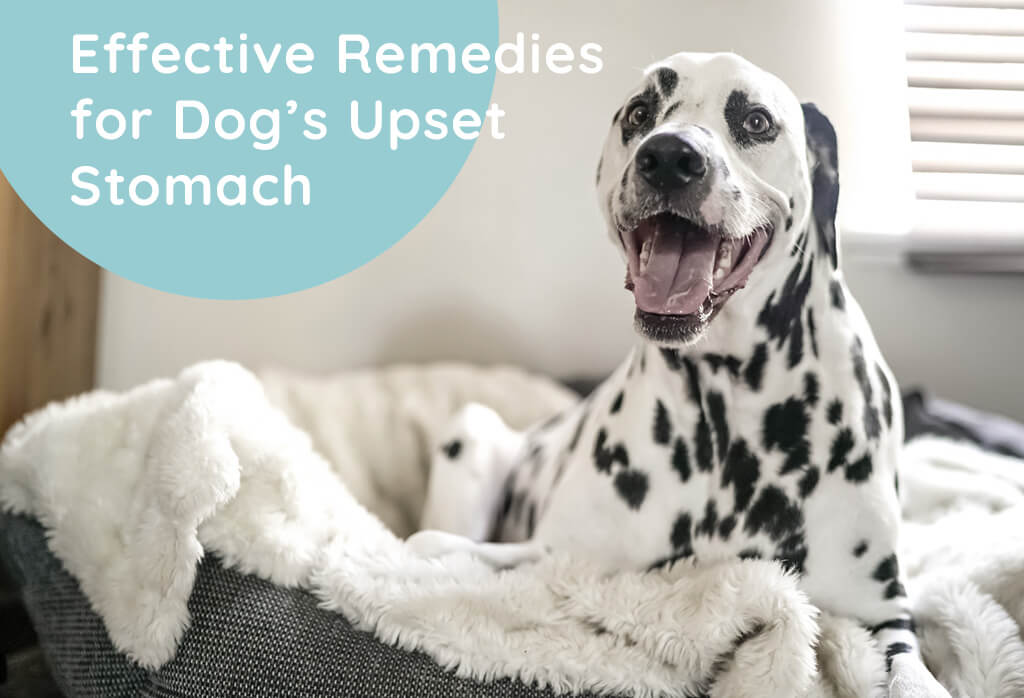Symptoms of a dog’s upset stomach are similar to humans. However, we can rush to the doctor or try home remedies when we experience any signs. But, what will your dog do? How would you recognize your dog’s upset stomach?
Read this article to learn about the causes, symptoms, and remedies of a dog’s upset stomach.
What are the symptoms of Dog’s Upset Stomach?
Generally, dogs experience vomiting and diarrhea when they have an upset stomach. However, these signs occur in dogs with upset stomachs:
- Loss of appetite
- Floor, lips, or licking
- Grass eating
- Flatulence
- Gulping
- Gurgling noises from the stomach
- Salivation
- Fatigue
When to See a Vet
It’s best to talk to a vet before trying any home remedy.
Take your dog to a vet if you see these symptoms:
- Frequent or repeated diarrhea and vomiting
- Fever
- Bloody diarrhea
- Dehydration
- Uncontrollable drooling
- Nervous pacing
Moreover, take your puppy to a veterinarian hospital if it’s less than 6 months old. In young puppies, parvovirus is a serious condition that can cause death.
What Causes a Dog’s Upset Stomach?
Every dog vomits occasionally. But, you must take your dog to a vet if it suffers from frequent vomiting or diarrhea. From indigestion to cancer, any condition can cause a dog’s upset stomach.
These obvious reasons can affect your dog’s stomach or intestine:
- Change in diet
- Heatstroke
- Consumption of toxic substances
- Stress
- Bacterial infection
- Uterine infection
- Viral infection
- Reaction to certain medicines
- Sensitivity or allergy to certain foods
- Constipation
- Pancreatitis
In addition, other chronic illnesses can also cause your dog’s upset stomach. You might be unaware of these underlying issues. But, it’s important to check them early. These issues can include:
- Parvovirus
- Cancer
- Stomach ulcers
- Inflammatory bowel disease
- Kidney or liver failure
Take your Fido to the vet in case of frequent vomiting or diarrhea. You can cure most of these conditions if you treat them on time.
Home Remedies to Cure Dog’s Upset Stomach
It’s recommended to go to the vet if your dog experiences an upset or inflamed stomach. However, you can try these remedies for mild diarrhea or vomiting:
1. Refrain from eating
Avoid feeding your dog when it’s trying to get rid of certain things. Fasting for 12-24 hours won’t cause harm to your household Fido. Skip a meal or two when your dog is dealing with GI tract issues. This will help it recover faster. However, you must consult a vet before making your dog fast. It’s hard for some dogs to tolerate fasting.
2. Keep your dog hydrated
Your canine friend throws out excessive water due to vomiting and diarrhea. It’s crucial to keep it hydrated. But, giving them too much water to drink right away can make their stomach feel worse. Thus, it’s recommended to use ice cubes or give a small amount of water every few minutes. This will help it stay hydrated without causing adverse effects.
3. Products that can help calm your dog’s upset stomach
Probiotics are another great home remedy. They can help solve your dog’s chronic digestive problem. There are living gut-friendly bacteria in these probiotics. This bacteria is naturally present in the digestive tract and other parts of the body. Additionally, you can try the following products as well that worked well for other dogs:
- DiarRice: Rice is a common remedy to calm an upset stomach. But, dogs can’t digest rice well. Therefore, you can give DiarRice to your dog. It contains all the soothing properties of rice that are easy to digest. It tastes like chicken. Mix it with wet food or dry food by adding a little water. DiarRice instantly shows results. So, consider medical treatments if your dog doesn’t show improvements.
- Pedialyte: Pedialyte is a great source to prevent dehydration. For this, you’ll need a syringe without a needle. Initially, fill the syringe with the mixture. Now, empty the syringe contents into your dog’s mouth. Massage the throat if your dog doesn’t swallow. This encourages it to swallow the contents.
Most importantly, consult a vet before giving any of the above products to your pup.
4. Feed them with foods that are light and effective
The following foods can help a dog’s with an upset stomach:
Canned pumpkin
100% canned pumpkin is best to feed when your dog is dealing with an upset stomach. Pumpkins are low in glycemic index. This means that the body absorbs it slowly. It acts as a soothing agent for the irritated GI tract. Make sure you’re buying the pure pumpkin and not the one with sugar and spices.
Shredded chicken
Boiled, plain, and unseasoned shredded chicken is easy to digest. It is rich in essential vitamins, fats, minerals, and amino acids. These can help calm your dog’s upset stomach without fasting.
Bone broth
Bone broth is a mild liquid that is easy to digest. Dogs love homemade bone broth. It keeps your dog hydrated. You can add it to their dry meal to encourage eating.
Baby food
Baby food is great for dogs with an upset stomach. It is easy to swallow and digest. Veterinarians suggest giving Stage II baby foods containing meat like chicken, turkey, or lamb. Make sure it’s free from garlic or onions.
Chicken with rice
This is an effective food to feed your canine friend. Chicken and rice are two prime dog foods. They sit well on your dog’s upset stomach. A boneless chicken and boiled rice is all you need.
Other foods
Some other foods can also cure your dog’s upset stomach. These foods are:
- Banana
- Oatmeal
- Sweet potatoes
- Plain, unsweetened yogurt
Bottomline
These effective home remedies can calm a dog’s upset stomach. However, you must consult a vet before trying any remedy. Not everything works for each dog. You might worsen the condition by trying anything that doesn’t work for your dog. Thus, it’s best to visit your vet if you notice these signs. Give your dog prebiotics and probiotics to maintain a healthy gut. Your vet will suggest a trustable brand.
Image credits:
Featured image dog from Pexels
In-post image 1 from Pexels
In-post image 2 from Pixabay









